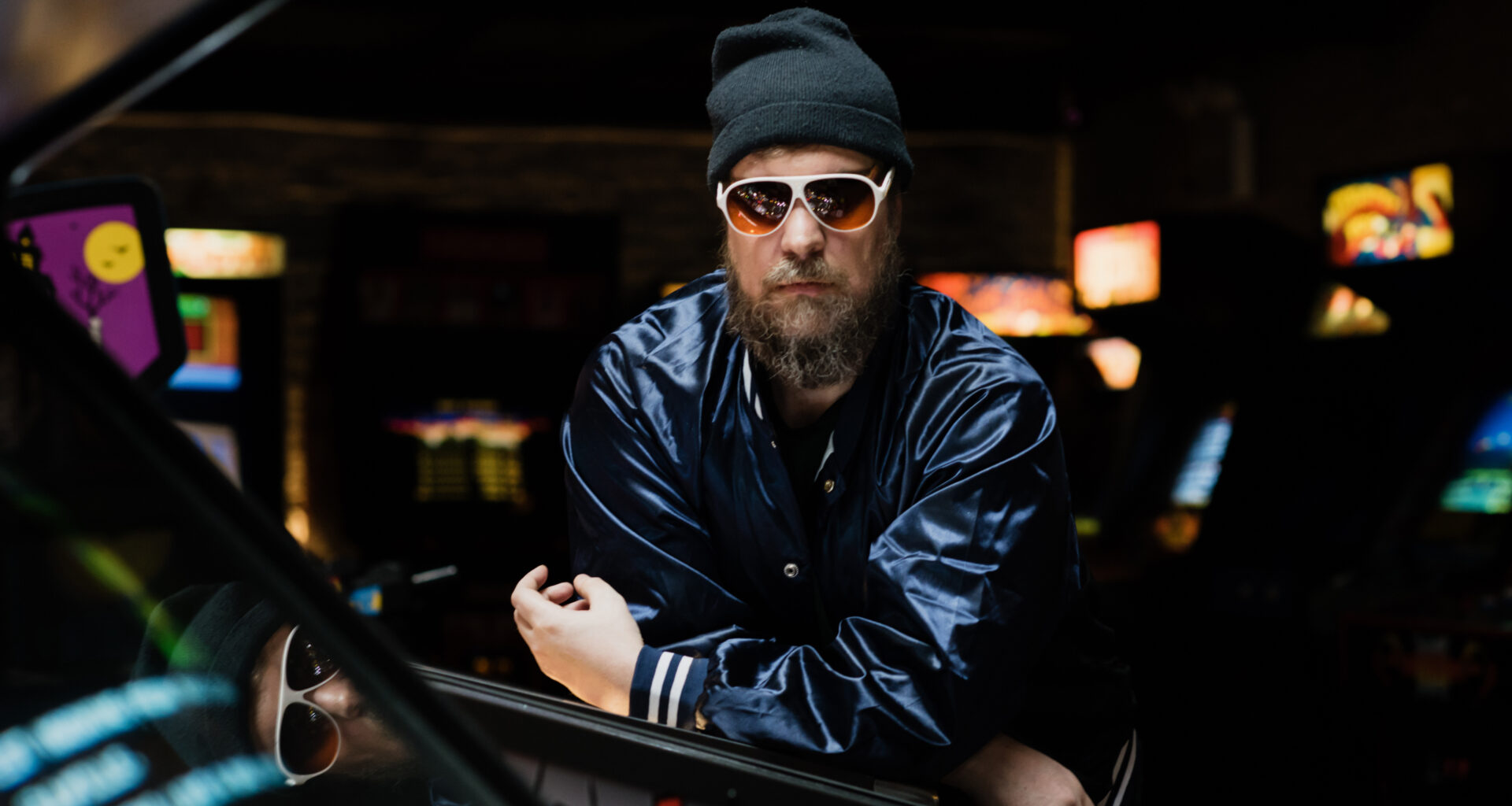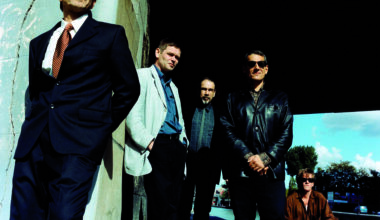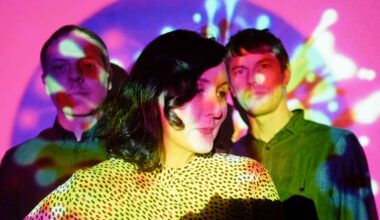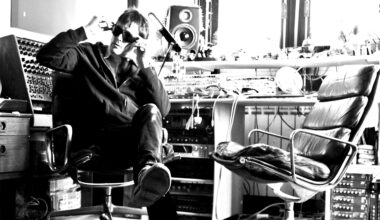After recording with Wrangler mastermind Benge in deepest, darkest Cornwall, it seems John Grant has fully embraced the electronics his other albums have only hinted at…
“Well, that’s not going to happen!” guffaws John Grant, tucking into another mineral water as he approaches the last of a long day of interviews for his new album ‘Love Is Magic’. Electronic Sound has suggested, with some mischief, that seeing as Grant declares in his publicity material that this new LP is the record he always wanted to make, might he be prepared to publicly disown his previous outings? No such luck… but we do get a minor concession out of him.
“I would never disown them,” he says as we settle in the bar area of the Strongroom, the east London studio complex that is home to his UK record label Bella Union, “but there is maybe a level of false advertising on ‘Queen Of Denmark’, because my heart has always been shaped like a synthesiser.”
That album, released in 2010 and recorded with the backing of esteemed guitar band Midlake, was the beginning of Grant’s solo career following the break up of his much-loved cult band The Czars. Relocating to Iceland from his native Michigan, Grant’s booming tones and self-analytical lyrics have earned him a loyal following. The arrival of his fourth and most electronic outing so far, ‘Love Is Magic’, is surely set to bring him to an even wider audience.
The new record takes in everything from the infectious electropop of ‘Preppy Boy’ and ‘Diet Gum’, a hilarious pastiche of Grant in full tantrum mode, to the genuinely heartbreaking ‘Touch And Go’. The sparkling sound within, rich in vintage synth magic, owes much to a sterling production job from the omnipresent Benge, who will be familiar to Electronic Sound readers as a prolific producer, member of Wrangler and project collaborator extraordinaire with his fingers in a great many pies.
Grant headed to the wilds of Cornwall to record ‘Love Is Magic’, where Benge relocated after selling up his Shoreditch base of many years to Belgian trio Soulwax. Working with Benge was, says Grant, “one of the funnest things I’ve ever done”.
“I love his dry humour,” says Grant. “So there was constant laughing and giggling. He’s just so fucking knowledgeable about synths and gets so excited about it. He’s also very patient. You know, engineering is a very difficult job, especially when people are, ‘kind of like this, like that’. He’s a great sound designer, as well as knowing all the ins and outs of all these instruments. He is an incredible wealth of knowledge. Basically, he was making it possible for me to do whatever I wanted to do.”
Grant points to two very contrasting jobs Benge had to do on two tracks to show the breadth of his skills. The genesis of the song ‘Tempest’ came a decade ago, with a loop that Grant had created using an arpeggio… trouble was, he’d lost the computer that the idea had been made on, and all he had was a low quality MP3.
“I’d automated the arpeggiator to change direction,” says Grant, “so sometimes it was going up and sometimes it was going down, and I was holding weird chords, improvising, and I accidentally came up with this incredible loop. So then in order to use it for this record, we had to create it from scratch.”
The solution was to put the MP3 into Ableton and create a map with all the notes on it, figure out the directions and the delay, and then recreate it. It was no mean feat.
“I wanted to effect it too, so we used a sound on an old Prophet VS, which is one of my favourite-ever synths, it has the most incredible string sounds. So we had this great sound, and we put it through a Roland System 100 filter and fucked with it that way, because I wanted to flesh it out and create other parts of the song with it. Which is how ‘Tempest’ came into being.”
By contrast, the album’s opening track ‘Metamorphosis’ demanded a very different ability, namely turning a nebulous idea into reality.
“Sometimes it’s very difficult to put exactly what you want into words. We worked a lot on the sounds of ‘Metamorphosis’. I’m a big monster movie fan, and I love the sounds of metamorphosis, you know, when a creature’s growing. There’s going to be portamento involved and there might be an LFO to make it go… [he impersonates a throbbing, evolving bass frequency]… so this thing is changing into something, you know. I would often say things like, ‘I want this to sound like lava bubbling under the surface of the earth before it springs forth’. And Benge will be like, ‘Oh yeah, I think I get what you mean’. I was so fucking giddy with joy most of the time making this album, it was criminal.”
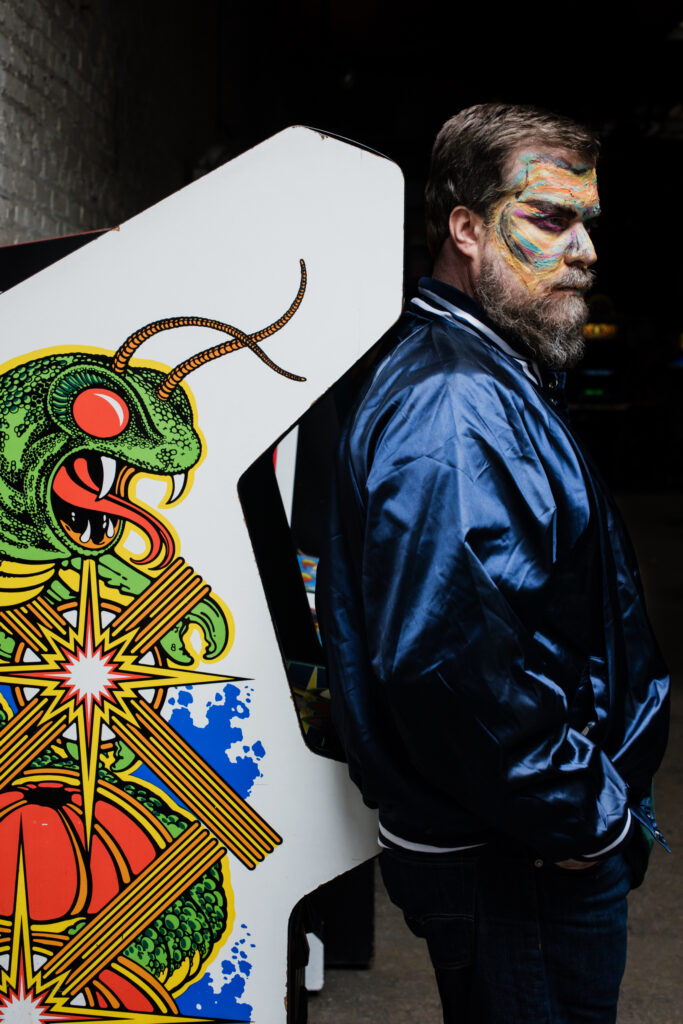
It wasn’t hard, of course, to get himself into monster movie mood, what with the studio being out on the edge of Bodmin Moor. He describes ‘An American Werewolf In London’ as one of his all-time favourite films, so did being out in the middle of one of the wildest parts of the UK, not to mention all the rumours about the Beast Of Bodmin, put him in mind of the film?
“You better fucking believe it!” he says. “Stick to the path! Stay on the road, or whatever they say in the pub. Don’t go onto the moor!”
Although there were other less mythological dangers to negotiate in Cornwall too. At the end of a day’s recording, they’d invariably head up to the local pub on the top of a nearby hill. The danger came not from the pub, which was a lot more friendly than the one in ‘American Werewolf’, but the drive home.
“I don’t drink, so I’d drive, but it was the first time I’d driven with the gear stick in my left hand,” says Grant. “I also needed glasses, but I hadn’t got them yet, so everything was blurry. I was driving the boys from Wrangler home from the pub, with the gearstick in my left hand, down these tiny little dark lanes with the seven-foot hedges on either side. It was pretty fucked up.”
The horror movie vibe bled over into another project that Grant crafted in Cornwall, with the aforementioned Wrangler. The band Creep Show found Grant teaming up with Benge, Tunng’s Phil Winter and Stephen Mallinder from Cabaret Voltaire for a live show celebrating 40 years of the Rough Trade label in 2016. The collaboration worked out wonderfully, and the ‘Mr Dynamite’ album, which was released to critical acclaim back in March, was the explosive result.
“There’s some moments of real Cabaret Voltaire-ness on the Creep Show stuff,” says Grant, “which, speaking of heaven, is another great love of mine.”
In many ways, ‘Love Is Magic’ combines two of Grant’s big loves. Firstly, he’s evidently an authority on horror soundtracks, namechecking a huge list of films with influential music, including ‘The Beast Within’, ‘They Live’, ‘The Fog’ and the first three ‘Halloween’ flicks, especially the third, with its score by John Carpenter and Alan Howarth. He waxes lyrical about a beautiful reissue of the soundtrack by the Death Waltz label.
“Thank God for all the people making these labours of love,” says Grant with sincere enthusiasm. “People like you making a magazine where we can talk about things like this, and people who are putting out those beautiful horror scores.”
Secondly, ‘Love Is Magic’ has given him a chance to fully immerse himself in synth culture. Ever since his early childhood in Michigan, and hearing ABBA, he’s been fascinated by electronic music and synthesisers. He recalls beginning to hear them materialise on tunes by bands such as Supertramp and Yes in the 1970s.
“I wasn’t aware of artists like Throbbing Gristle, but they were there in the 70s,” he says. “I can’t really believe it was, I can’t really believe that stuff like Kraftwerk existed either, but I knew about ‘Popcorn’ and I knew about Jean-Jacques Perry, who did ‘EVA’. The album I had by him was ‘The In Sound From Way Out!’, and then there was Wendy Carlos’ ‘Switched On Bach’, we had that when I was a kid. I had no idea it was by Wendy Carlos, I thought it was the guy in a wig on the sleeve!”
The synthpop revolution was beginning to happen as the 70s turned into the 80s (“we were going apeshit over The Human League, and Duran Duran and Devo were huge”), and Grant remembers his brother pouring scorn on Eurythmics when early hits such as ‘Sweet Dreams’ and ‘1984’ became massive in the States.
“I remember my brother thinking it was just stupid electronic music,” he says, “music from a box that took no talent to make. I think a lot of people believed that for a long time.”
As the 1980s progressed, so his tastes developed. Depeche Mode’s ‘Speak & Spell’ album was a big influence, as was Cabaret Voltaire’s ‘Do Right’, along with Fad Gadget, Thompson Twins, Visage, New Order and Pet Shop Boys. There’s a special place reserved in his heart for the work of Yello too.
“Their early albums make such an interesting use of electronics,” he says. “What I love about Yello, what a lot of people love about Yello, is there’s such serious musicianship and knowledge of harmony and structure, subtraction and addition of sounds, keeping tension, building things up and taking away… but also the humour. And the amazing collaborations with people like Shirley Bassey and Billy Mackenzie.”
A love of electronic music is what drew Grant to alternative culture and its clubs, and he describes the moment he finally came across the tribal gathering of skins, punks and other sub-genres as the time he finally found his people.With that taste in music, we demand to know, surely he must have been fond of strutting his stuff on the dancefloor.
“I was doing something that maybe could have been called that,” he says, before qualifying the statement with, “in an Elaine from ‘Seinfeld’ kind of way. I don’t know if you’re familiar with the Elaine dance from ‘Seinfeld’. If not, just look it up on YouTube and treat yourself to that.”
In conclusion, Grant certainly has realised his synthesiser-shaped dreams on ‘Love Is Magic’, which manages to balance the coolness of machine music with the emotional reach that all his productions to date have been big on. And he’s not worried about what anyone else thinks about that.
“I think the important thing,” he says, “is to remember that you can do whatever the fuck you want. Anytime.”
‘Love Is Magic’ is out on Bella Union
